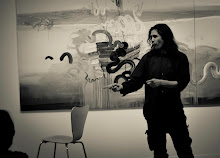Finishing the Work - or Performing Spinoza's 'Political Treatise' as Post-Modern Tragedy
How do you finish off an unfinished work?
This is a problem of course familiar to literature, drama or music ('The Mystery of Edwin Drood', 'Sanditon' etc) - But in philosophy?
This performance of Spinoza's unfinished Political Treatise answers this problem, by turning the incomplete nature of the work actually into something ineffable about its argument. The last line I use actually comes from Spinoza's masterwork 'Ethics', where it is its last line, but I use it here (quite erroneously) to describe democracy, and reflect something of its immanence, in Spinoza's argument at least. Hence I develop the idea in the performance, that the final argument of the book, actually captures political change in a dark spiral, where no government is really ultimately stable or ever perfect - a fact which renders the book necessarily incomplete.
Moreover this unfinished state allows me to actually play with Spinoza and what he is saying. So that the argument I think I have him make, is that 'pure democracy' represents the limit of state understood as if it were the infinite god - as immanence (An argument found in Antonio Negri and the 'Savage Anomaly'). The problem is that this immanent but theoretical pure democracy does not translate at all into the actual, and finite, real situations we live in: As Spinoza says - We all agree as we are in God, but not as we are in life.
From which it necessarily follows that humanity faces the deep problem as to how to express their collective reality. The traditional answer, the Monarchy, involved dressing up that collectivity in a single ruler, and so expressed immanent collectivity as if it were a single transcendental unity. That is, as if it were a mystery, whose nature lay at a point beyond us all, and given to us by God. The ruler is therefore somehow a meta-person. Spinoza's very original twist here is that this position is fine in transcendental theory, but in immanent (actually lived) reality, necessarily results in madness.
It is far better, Spinoza suggests, to enshrine arguments in meta-organisations-cum-political-parties which ensure debate, but which will, however, delimit what can be said and thought. The parties become transcendental (and so eternal) if you like, while their debates remains immanent, vital and creative. In our times, we see a number of very 'Aristocratic' parties - which alone, it often seems, pattern debate, and define what can be thought or said: For example, the ideas of the Left and Right, The Free Market and Capitalism...
Spinoza thereby sets up a dual problem in such Aristocracies. On the one hand, debates have to be institutionalized: Revolutions themselves do not change anything, as the power/debates which eventually dominate the emerging system will tend to be the ones already there with their institutions and their organisations, and not the original revolutionaries (so armies and religious organisations win out over people). On the other hand, new ideas that cannot be expressed by the 'offical' argument makers (such as those concerning the environment) remain unsayable and unthinkable by the political system.
The aim of this piece/performance is therefore to complete the Political Treatise by drawing out the fact that in a modern sense the book, like our political system, can never be finished, for no system is ever perfect, as it actually exists. Thence in the alchemy of performance, Spinoza's death becomes also our own tragedy, for our inability rethink the political system reflects the very nature of this posthumous work.
Does it work as Philosophy? - I think so. Does it work as performance? - I hope so, though it is darker and more difficult than I often am - but judge for yourself.


No comments:
Post a Comment